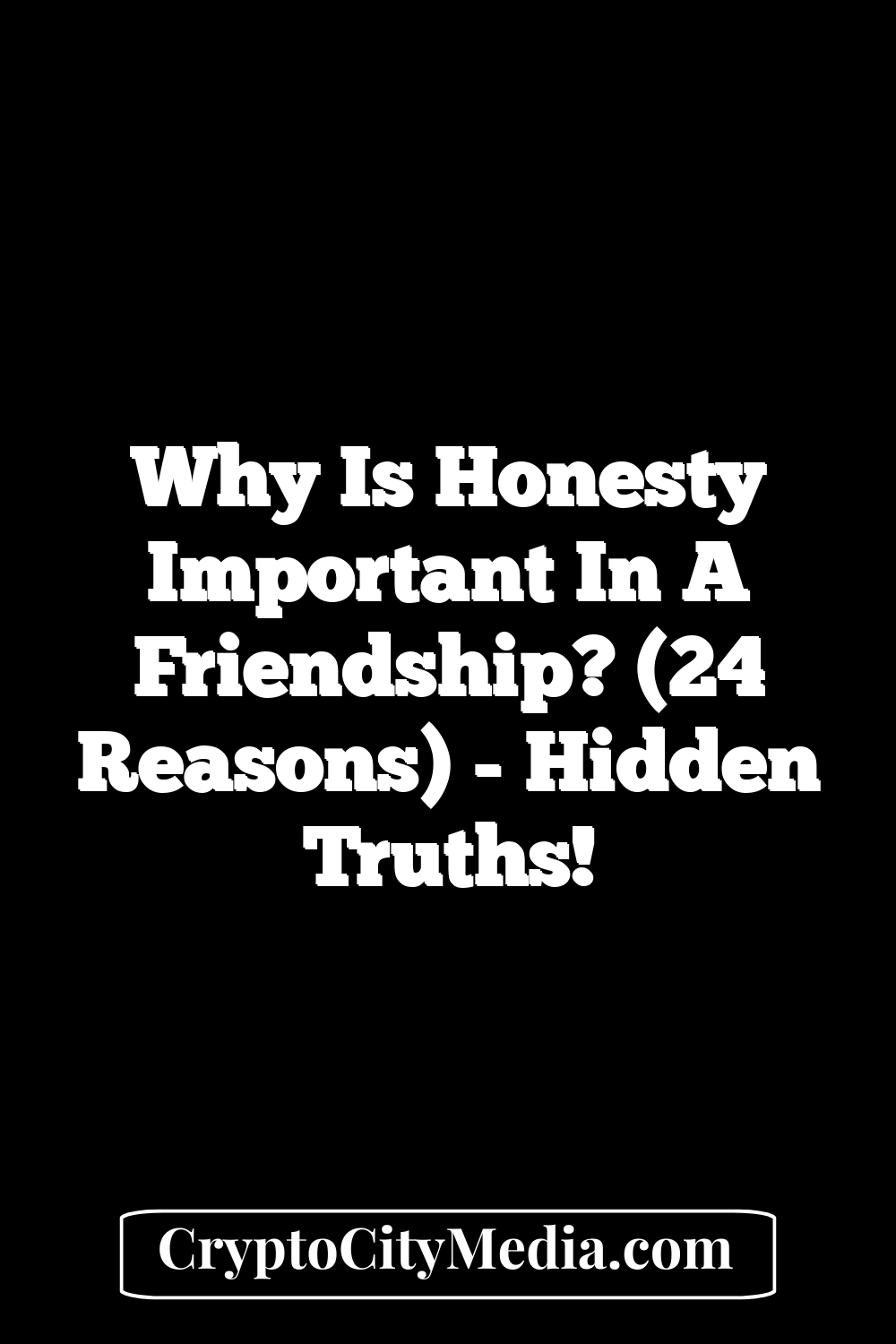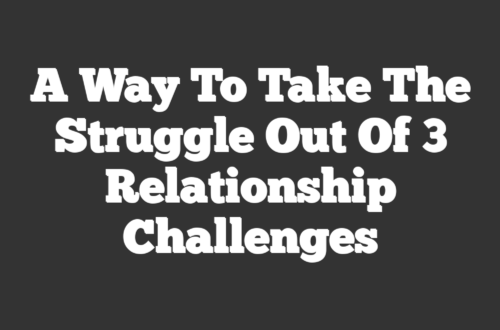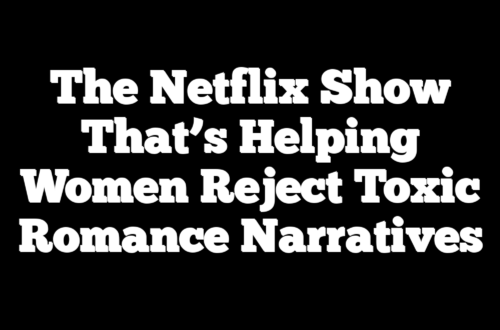There we were in the clothing store — on a mission to find the perfect party dress. My friend’s approval came easily until I slipped on a dress that was less “wow” and more “oh no.” It didn’t take long for her to point it out: “That’s not the one for you.”
That tiny truth, though it didn’t feel great, meant the world. It showed me what real friendship is — honest, even when it’s not all compliments and cheers.
Some believe it’s kinder to skip the truth if it might sting. Are they onto something, or is there more to it? Stay with me as we discover how speaking the truth, even the hard bits, is fundamental to long-lasting friendships.
Honesty Builds Trust Between Friends
If there’s one thing I’ve learned, it’s that trust is the glue in any friendship. And honesty? Well, that’s the main ingredient. Being honest with friends means they know they can take your words to the bank.
I mean, we all have that one friend who always tells it as it is, and while it might sting sometimes, it’s also incredibly refreshing. That’s the friend you call when you need a reality check, isn’t it?
What this looks like:
- Keeping promises: If you say you’ll be there, be there.
- Giving honest opinions: If you’re asked for advice, speak from the heart.
- Admitting mistakes: Owning up when you’re wrong shows maturity and respect.
It Allows for Personal Growth and Self-Improvement
Being honest with friends often means we get to see our true selves through their eyes. It’s about personal growth, even when it’s a little uncomfortable.
Take a moment and imagine this: You’ve developed a habit of not following through with plans, and your friend points it out. They’re not mad; they’re just letting you know that it’s been noticed.
Example: Your friend might say, “I was really looking forward to our movie night, but you’ve canceled last-minute a few times now. What’s up?” It’s a simple question, but it reveals a pattern you hadn’t noticed.
Honesty Promotes Openness in Communication
Now, let’s get real about communication. Honesty keeps the conversation clear and straightforward, and it’s such a lifesaver in friendships.
Have you ever had a misunderstanding with a friend blow up into a full-blown drama? Yeah, not fun. But when you’re honest, you’re clearing the fog before it can even settle.
Example: If your friend has picked up a habit that worries you, honesty gives courage to manage it. “I’ve noticed you’re doing this; it doesn’t seem like you. Is everything alright?” is far better than talking behind their back or letting concern turn to judgment.
It Is Key to Resolving Conflicts Healthily
Let’s face it, sometimes we bump heads with our friends, right? But here’s where honesty comes in like a superhero — it helps us fix things before they turn into bigger problems. Discussing our worries openly can lead to a quicker resolution.
Have you ever been in a tiff over something small? Like who was in charge of bringing snacks for game night? An honest heart-to-heart can clear the mix-up and get you both chuckling over the mishap.
What this looks like:
- You explain why you felt slighted when your friend was late, rather than giving them the cold shoulder.
- Your friend admits they forgot their promise to help you move and sets a new date.
- Both of you discuss how to prevent similar situations, making your friendship stronger.
Honesty Can Prevent Hurtful Deception
Being straight with our buddies keeps everything above board. When we’re transparent about our feelings and thoughts, it stops those small fibs from becoming big issues.
Deception has a way of creating distance, and I think we can all agree that keeping things real with our pals is what we’re after.
Example: If you don’t like the restaurant your friend keeps choosing, be honest about it. Say, “I think it’s great you love that place, but I’m not a huge fan — can we try something new?” It’s much better than making up excuses and potentially hurting your friend in the long run.
It Strengthens the Bond of Friendship
When we’re 100% ourselves, and we know our friends still have our backs — that’s friendship gold. It’s like being able to share the last slice of pizza, knowing there won’t be any hard feelings. Being honest with each other means both of you can drop the act and get to the good stuff: a deeper friendship.
So, when you’re honest about your thoughts on that trendy new show, even though your friend is a fan, it invites open discussion, not a TV standoff.
What this looks like:
- You admit that the high-energy social gatherings your friend loves are draining for you.
- You tell your friend honestly when something they do makes you uncomfortable.
- When you share your aspirations and fears, you create a deeper bond of mutual trust and support.
It Encourages a Deeper Connection
When we share our truth, we open a door to a deeper level of friendship. Friends who are honest with each other get to see more than just the surface; they get a look into the real thoughts and feelings underneath. This kind of sharing brings people closer.
It’s not just about agreeing all the time, it’s about understanding each other’s unique points of view. Being honest is how we let our friends truly know who we are.
Example: When a friend shares that they’re feeling overwhelmed with work, they’re not just venting, but letting you into a vulnerable space. You get the opportunity to support them, maybe by offering help or just listening.
Honesty Prevents the Buildup of Misunderstandings
Misunderstandings can turn small things into big problems. It’s like a snowball rolling downhill. But when friends are honest with each other from the start, those little issues can be sorted out before they grow.
Honesty keeps everyone on the same page and nips confusion in the bud. It’s much simpler to deal with the truth than to untangle a web of misunderstandings.
Example: Take the time you thought your friend was upset with you because they hadn’t replied to your messages. Instead of letting that worry grow, you ask them about it. Turns out, they were just swamped with family stuff and your honesty cleared up a potential misunderstanding straight away.
It Creates a Safe Space for Authenticity
A safe space is where you can be your true self without fear of being judged. Honesty helps create this kind of space in friendships.
When everyone feels comfortable being honest, it’s easy to show who you really are. This space is so important because it lets friendships grow in a healthy, real way. Without this safe space, friends may hide their true selves, which doesn’t help anyone.
What it looks like:
- Being yourself: Acting naturally and comfortably in your friend’s presence.
- Expressing emotions: Feeling free to show happiness, sadness, excitement, or any other emotion.
- Honoring boundaries: Respecting personal limits and expectations in the friendship.
It Encourages Mutual Respect
Honesty kind of works like a friendship charm that promotes mutual respect. When we’re honest with our friends, it’s like we’re tipping our hats to them, saying, “I respect you.” It shows we value their ideas and feelings just as much as our own.
This respect leads to more honesty, and pretty soon, it’s bouncing back and forth between us.
Example: When you disagree on a topic, honesty helps you express your opinions while still valuing theirs. You might say, “I see where you’re coming from, but I have a different view.” This approach shows respect for both your friend’s perspective and your own.
It Nurtures Reliability and Dependability
There’s something comforting about a friend who’s as reliable as your favorite old sweater. When friends make a habit of honesty, it’s like they’re giving you a reassuring nod that says, “You can count on me.” They become the ones who back up their promises with actions, not just with nice-sounding words.
It’s amazing how dependability can turn a good friendship into a great one. It’s all about knowing your buddy is the ‘show up’ kind, rain or shine.
What this looks like:
- Honoring plans: They say they’ll meet you at 3 PM, and there they are, at 2:55 PM, ready and waiting.
- Being a soundboard: When life throws a curveball, they’re the voice on the other end of the phone, listening.
- Predictable patterns: Their actions match their words so consistently that you almost know what they’ll do before they do it.
It Helps in Sharing Genuine Advice
You know, sometimes we just need that friend who’ll tell it to us straight. When a friend hooks us up with honest advice, it’s like getting a golden ticket to figuring things out. It’s precious because they’ve got your back, and they’re looking at your situation with a clear, loving perspective.
Take our FREE Relationship Quizzes (no email sign-up necessary):
Get to Know Yourself Better with Our FREE Quizzes! (no email sign-up necessary):
This honest advice can make all the difference, whether it’s about a job, a relationship, or a wild dream.
What this looks like:
- When you’re not sure about a big choice, and your friend gives it to you straight.
- Your buddy points out something you might have missed, saving you from a facepalm moment.
- Getting advice that feels right because it comes from someone who truly gets you.
One loyal friend is worth ten thousand relatives.
Euripides
Honesty Upholds Loyalty in the Friendship
Loyalty in friendship is about sticking by each other. Being honest is how we show our loyalty. It’s more than just not spilling secrets; it’s about standing firm even when things get rocky.
Honest friends are allies, the ones who have your back no matter what. You can count on them because they stick to their word and prove their loyalty time and time again.
What this looks like:
- Defending your friend in their absence, speaking up for them because it’s the right thing to do.
- Sharing honest concerns when they’re about to make a questionable choice, because you care about their wellbeing.
- Staying true to your word, because loyalty means promises are kept, not broken.
It Establishes Moral Integrity Within the Friendship
Moral integrity is a big term for doing what’s right, even when no one is watching. In a friendship, honesty sets the standard for this kind of integrity. Friends who are honest with each other show that they live by good values and encourage each other to do the same.
This trust in each other’s integrity strengthens the friendship. It turns the friendship into a place where both can count on each other to be good people.
Example: When finding money that someone dropped, an honest friend would try to return it to the owner. That integrity isn’t just an action; it shows they stick to their values. And when you see this, you trust them even more because their honesty is proof of their character.
It Validates the Feelings of Friends
We all want to feel like our emotions matter. When we’re honest with our friends about how we feel, it shows them that their feelings are important, too.
This validation can be really comforting. It can make friends feel safe to open up about their own emotions. When we acknowledge each other’s feelings, it helps us connect on a deeper emotional level.
Example: Your friend is feeling down about not getting the job they wanted. Instead of just cheering them up, you acknowledge their disappointment by saying, “It’s OK to feel sad about this.” Sharing your understanding this way helps them feel supported and heard.
Honesty Shows Care and Love
Caring for friends means being honest with them. When we tell the truth, we help our friends make good choices for themselves. It’s not about only saying things that will make them happy. Real care comes from honest talks that can sometimes be tough but are meant to look out for them.
What this looks like:
- Telling your friend you’re worried when they seem down because you want them to feel better.
- Having the tough talks, even if it’s about pointing out a mistake, because you care.
- Cheering loudly for your friend when they succeed, because you’re truly happy for them.
It Is the Foundation of a Lasting Friendship
Long-lasting friendships don’t just happen; they’re built on being honest with each other. These friendships can stay strong through any problem because they have trust at their center.
When friends truly know and accept each other, that friendship can last a very long time. Starting with honesty means your friendship has a strong base to grow from and can stay sturdy over the years.
Example: Think about friends who have been together for decades and have seen it all. They stay close because they’ve always been honest with each other.
To have a friend and be a friend is what makes life worthwhile.
Unknown
Honesty Grows Patience and Understanding
Being patient and understanding is something we learn over time, and being honest helps us get there. Sometimes honesty makes conversations hard, but those talks teach us to wait and see things from the other person’s side.
This is important in a good friendship. By being honest, we learn to give our friends the time they need to talk and express themselves.
What it looks like:
- Listening to your friend without rushing them, showing you’re there for them.
- Looking at things the way your friend does to avoid making quick judgments.
- Staying calm and willing to hear things out, especially when what your friend says is unexpected or hard.
It Sets Realistic Expectations
Clear honesty in friendships means everyone knows what to expect. When we’re upfront with our friends, there’s no room for guessing or letdowns. We avoid misunderstandings by being clear about what we can commit to.
This honesty makes our friendship better because it’s built on real understanding. When we set honest expectations, our friends appreciate our sincerity and respect our boundaries.
What this looks like:
- Telling a friend upfront that you can’t make it to their event instead of saying, “Maybe” and “Not going”.
- Letting your friend know the kind of help you can offer.
- Talking about your own limits so friends know what they can expect from you.
It takes a great deal of courage to stand up to your enemies, but a great deal more to stand up to your friends.
J.K. Rowling
Honesty Leads to Forgiveness and Reconciliation
Even the best of friends can have a fallout, but honesty can mend fences. Admitting errors and discussing hurt feelings openly can set the stage for forgiveness.
When we’re honest, we lay out our thoughts and emotions, which can lead to understanding, forgiveness, and getting back on track in our friendship. This honesty bolsters our bonds and can heal the rifts between us. Forgive and move forward — that’s the power of honesty.
Example: If you’ve hurt a friend’s feelings with a careless comment, being honest about your regret can pave the way to their forgiveness. “I didn’t realize my words would hurt you, I’m really sorry,” can start the healing process.
It Allows Friends to Know the Real You
With honesty, there’s no need for pretense in friendships. You can show your true self, quirks and all.
When we’re genuine with our friends, they get to know who we truly are and love us for it. This authenticity builds a deeper connection, trust, and acceptance. Friendships based on the real you are the ones that last because they’re rooted in truth.
What it looks like:
- Sharing your real interests and opinions, even if they’re different from your friend’s.
- Being open about what you’re going through, not just the good stuff, but the challenges, too.
- Letting your friend see your silly side, the one you don’t show just anyone.
It Maintains Balance and Fairness
In friendships, honesty helps keep things balanced and fair. I mean, think about it — when both friends are honest, no one feels like they’re doing all the work or being left out. It’s a give and take that feels just right.
Balance is everything, and honesty ensures that none of you are overstepping or underserving. And let’s be real, when things are fair, everyone’s happier for it.
What this looks like:
- If you’re always the planner, you say, “Hey, your turn to pick the movie!” and keep it fun and fair.
- Taking turns in choosing where to go or what to do.
- When you’re out for coffee, making sure you both have turns treating each other.
Honesty Contributes to a Healthy Self-Esteem
Being honest with yourself and others is key to feeling good about who you are. When we’re our genuine selves, we ditch the stress of pretense and feel confident in our skin.
This sense of self-approval that comes from being truthful is liberating. It’s like, when you know you’re being real, you inherently value yourself more. And when a friend nods along to your true stories, it just cements the fact that you’re loved exactly as is.
What this looks like:
- Accepting compliments gracefully instead of downplaying them.
- Sharing your real success stories without exaggeration or modesty.
- Talking about a tough day without sugarcoating, because the honesty feels freeing and connects us deeper.
It Minimizes Anxiety Over Hidden Truths
Let’s face it — keeping things under wraps is like walking with a pebble in your shoe; it’s just constantly uncomfortable. This openness takes away the fear and stress that come with secrets.
You breathe easier knowing your friendship is transparent, like crystal-clear waters. There’s no second-guessing or reading between the lines, just the peace of knowing the truth is out there. And isn’t that just a weight off your shoulders?
Example:
- When you mess up, rather than dodging, you step up and say, “Yep, that was me. Sorry!”
- Being open about not liking something instead of pretending you do.
- When you’re clueless on a topic, instead of bluffing, admitting you’re in the dark can actually spark a great learning convo.
Honest hearts produce honest actions.
Brigham Young
Frequently Asked Questions
Can a friendship survive without honesty?
While it’s possible for friendships to exist without total honesty, they often lack depth and true trust. Without honesty, misunderstandings can fester, leading to resentment and weakening the connection.
What if honesty hurts my friend’s feelings?
It’s possible that honesty can sometimes lead to hurt feelings, but it’s all about how the truth is presented. It’s important to be compassionate and considerate when being honest, ensuring that your intent is to support, not to hurt.
Is there ever a time when it’s okay to withhold the truth from a friend?
There may be rare occasions when withholding the truth is necessary to protect someone’s feelings, but generally, it’s better to find a gentle and respectful way to be honest. Transparency is usually the best policy for the health and longevity of a friendship.
How can I be more honest with my friends?
Start by being honest with yourself, and then practice expressing your thoughts and feelings to your friends in a kind and respectful way. Remember that trust builds over time, so start with small truths and work up from there.
Final Thoughts
In the end, tiptoeing around the truth to avoid a little discomfort doesn’t really do us any favors in the friendship department. Real honesty, not half-truths, keeps our friendships strong and real. When we’re honest, we show our friends we really respect them, and that’s what makes a friendship last.
When you think about your closest friends, they’re probably the ones who always tell you the truth, right? Let’s aim to be that kind of friend, the one who’s honest because it shows we care.
And let’s be thankful for friends who are honest with us, too! After all, honesty is what makes a friendship truly special.





